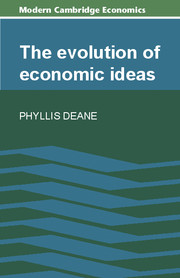Book contents
- Frontmatter
- Series preface
- Contents
- Introduction
- 1 Origins of modern economics
- 2 Adam Smith's theory of value
- 3 Origins of modern growth theory
- 4 Classical monetary theory
- 5 Ricardo on value, distribution and growth
- 6 Scope and methodology of classical political economy
- 7 The marginal revolution and the neo-classical triumph
- 8 The neo-classical theory of value
- 9 The Marxian alternative
- 10 Neo-classical orthodoxy in the inter-war period
- 11 Monetary theory in the neo-classical era
- 12 The Keynesian revolution
- 13 Twentieth-century growth theory
- 14 Methodological divisions in economics since Keynes
- Index of names
- Subject index
5 - Ricardo on value, distribution and growth
Published online by Cambridge University Press: 05 June 2012
- Frontmatter
- Series preface
- Contents
- Introduction
- 1 Origins of modern economics
- 2 Adam Smith's theory of value
- 3 Origins of modern growth theory
- 4 Classical monetary theory
- 5 Ricardo on value, distribution and growth
- 6 Scope and methodology of classical political economy
- 7 The marginal revolution and the neo-classical triumph
- 8 The neo-classical theory of value
- 9 The Marxian alternative
- 10 Neo-classical orthodoxy in the inter-war period
- 11 Monetary theory in the neo-classical era
- 12 The Keynesian revolution
- 13 Twentieth-century growth theory
- 14 Methodological divisions in economics since Keynes
- Index of names
- Subject index
Summary
The abnormal inflationary pressures associated with the Napoleonic Wars had shown up monetary theory as an area in which Adam Smith had clearly failed to provide the kind of theoretical framework appropriate to the analysis of urgent policy problems. The other economic policy issue dominating the early decades of the nineteenth century was the question of agrarian protection embodied in the Corn Laws. The issues raised here went to the heart of Smith's disciplinary framework for economics and inspired more fundamental attempts to revise orthodox economic theory. It was in this context that Ricardo turned his attention to a systematic study of the principles of political economy. His Essay on the Influence of a Low Price of Corn on the Profits of Stock appeared in 1815, the same year as Malthus' Inquiry into Rent and West's and Torrens' pamphlets on the same subject. In effect, the policy issues were beginning to hinge on questions relating to the distribution of the national product between rents, profits and wages and those who drew their economic theory from the Wealth of Nations found it inadequate for these purposes. Uppermost in Ricardo's mind when he focused on the price of corn and the level of profits was the danger that a high price of corn (the chief wage-good) would depress profits by pushing up the share of wages in the value of output and thereby reduce resources for investment and hence retard growth.
- Type
- Chapter
- Information
- The Evolution of Economic Ideas , pp. 60 - 70Publisher: Cambridge University PressPrint publication year: 1978

